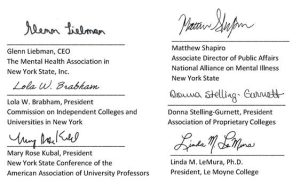Mental Health Update

Letter to Governor Hochul Urging Support for Mental Health in Colleges in the State of the State
Happy New Year:
Following up on MHANYS and Siena College summit recommendations, we are urging Governor Hochul to include a reference to mental health in colleges in the State of the State as well as an initiative to support an investment in the budget for college mental health.
We thank several of our colleagues for signing on in support of this important initiative and thanks to MHANYS Public Policy Director John Richter for his leadership in putting this letter together and outreach to the community.
Glenn
CEO, MHANYS
(518) 434-0439 | MHANYS.org
Follow us online: MHANYS.org
Facebook: @MHAacrossNYS
Twitter: @MHAacrossNYS
December 23, 2022
The Honorable Kathleen Hochul
Governor of New York State
Executive Chamber
New York State Capitol Building
Albany, NY 12224
RE: College and University Mental Health
Dear Governor Hochul:
We the undersigned are writing to you to draw your attention to a national college mental health crisis that is no less severe right here in New York State. Our hope is that you would acknowledge this crisis in the annual State of the State address so that New Yorkers are fully aware of its severity and take concrete steps to mitigate the crisis. The general wellbeing of our state cannot be fully healthy so long as our institutions of higher learning are struggling. On behalf of 1.2 million postsecondary students, and over 300 thousand faculty and staff, we respectfully request your leadership on this issue.
A small but important step to help mitigate this crisis is to increase mental health literacy resources on campuses across the state. New York demonstrated success with a similar model in K-12 education. We urge you to invest in making comparable resources available to college communities as well. An investment of $500,000 would help provide training resources for students, faculty and staff on every campus in the state.
There’s evidence of a college mental health crisis dating back to at least 2007. Two studies in particular, both conducted by Active Minds, one of the nation’s premier research organizations contributing to adolescent and young adult mental health, show significant increases in the prevalence of mental illness among college students both before and during the COVID Pandemic. Data from the more recent study released in April of 2022, showed a 135% increase in depression and 110% increase in anxiety among college students between 2013 and 2021 and in 2021 60% of college students met the criteria for one or more mental health condition, double 2013.
College presidents are understandably troubled. A survey conducted by Inside Higher Ed, found that over 90 percent of presidents reported being very or somewhat concerned about student mental health during the COVID-19 crisis, making it their top concern. The American Council on Higher Education found that over 66 percent of all presidents are reporting an increase in the utilization of mental health services due to COVID-19.
This crisis is not limited to college students, but pervades the mental health and wellness of the whole college, including faculty, staff and students. More than half of college faculty report signs of professional burnout with 40% considering leaving their current jobs as a result of COVID changes. While stress was high at the onset of the pandemic, research has found that faculty anxiety appears to be increasing, with more faculty reporting peak stress now than at the beginning of the pandemic.
In February of 2022 the Mental Health Association in New York State, Inc. (MHANYS) released its White Paper: Mental Health & Higher Education in New York: A CALL FOR A PUBLIC POLICY RESPONSE. The report studied the history of mental health in higher education and examined the crisis on today’s campuses. It reviewed research to determine the state of the crisis and its impact on students and the growing demand for mental health services. In addition to assessing the response on college campuses, the study evaluated the broader public response, focusing on actions taken by the media, courts, advocates and legislatures. These findings were then analyzed against the exacerbating impact of COVID-19 on mental health. We believe more can be done through public policy and that possible legislative solutions are worth exploring.
In order to advance a conversation about this crisis, MHANYS convened a summit in October, 2022 to raise awareness and take a first step toward developing consensus around how New York might respond. The event brought together over 100 participants including statewide college associations, mental health advocates, state agency officials, legislators, national experts and area colleges. All of the undersigned participated in this event.
In response to the Summit the New York State Assembly Committee on Higher Education and the Committee on Mental Health held a joint hearing on November 30, 2022. We are encouraged by the actions taken by the Assembly. Together with your leadership, Governor Hochul, New York can lead the nation in responding to this national crisis and help to restore the health and wellbeing of our colleges and universities.
We look forward to working with your administration and lawmakers to take steps to address this very real crisis.
Sincerely,

